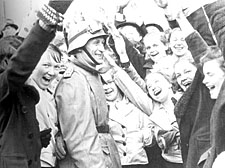|
|
 |
| |

A German soldier is made welcome duing the Austrian annexation in 1938 |
The triumph of cruelty in a nation of culture
Just how did the Nazis manage to take over Europe’s most culturally creative nation, asks Geoffrey Goodman
Hitler’s Reich: The Third Reich in Power, 1933-1939, by Richard J Evans
Allen Lane, £30
THE enigma of Hitler’s Germany continues to grip the fascination of several generations who had no personal experience of the Second World war.
The entire subject of the rise of Nazism and its success in taking over and completely controlling a nation that had been Europe’s most innovative and culturally creative society remains a phenomenon wrapped in myth.
Professor Richard Evans, the distinguished expert on the history of modern Germany, has taken on the task of trying to unravel the enigma – and does so brilliantly in this, the second of his trilogy about the rise and fall of Hitler’s Reich. Yet, even with this classic work of historical analysis we are still left with the question; yes, but…
The ultimate question, to my mind, which continues to baffle most of us is this: how can we explain such a brutal, barbaric system emerging from a culture, and language, that had produced an unmatched sequence of creative genius – Mozart, Beethoven, Goethe, Heine, Schiller, Einstein, Marx and Freud?
How was it that all this came to be blanketed out by a gang of ill-educated, crazed thugs who were close to dominating the whole of Europe and much of Asia?
Richard Evans, who is professor of modern history at Cambridge, examined the growth of Nazism in his first volume, The Coming of the Third Reich. His third and final volume will deal with the collapse of Hitler’s Germany in 1945.
Meanwhile this book is a major contribution to understanding the Hitler phenomenon. Indeed, it offers essential reading for contemporary generations who still appear insufficiently aware of what happened within Hitler’s prison camp after he gained power in 1933.
Evans makes the point powerfully with this passage: “The further in time we get from Nazi Germany the more difficult it becomes for historians living in democratic political systems…to make the leap of imagination necessary to understand people’s behaviour in a state such as Nazi Germany”.
To illustrate the point the author uses letters and diaries from a range of people across a wide spectrum of life who lived, and died, in Hitler’s Reich.
The most remarkable aspect during that period is how the Nazis were able to establish an extraordinary hold over every corner of German life.
Within a few months of taking power, the Nazis built 70 concentration camps into which they sent trade union leaders, communists and social democrats and any leading opponents of Hitler – even before they started arresting Jews.
What is particularly important in Professor Evans’s book is his evidence pointing to Hitler’s personal involvement in all this. Contrary to some of his apologists it is quite clear that the Fuehrer was not only aware of what was happening but actively supervised and monitored the tyranny.
Moreover it is also transparent from Professor Evans’s research that the majority of the German people had at least some idea of what was going on – and turned a a blind eye. Of course it is also true that Hitler’s demagogic oratory hypnotised and magnetised vast sections of the population across all social and class barriers – though especially the middle-class business groups, skilled artisans and influential sections of the upper educated groups notably those who were envious of Jewish intellectuals and their achievements.
One crucial aspect of the Third Reich story is whether Hitler and the Nazis intended war from the moment they took power: on this Professor Evans is in no doubt. He argues that the underlying purpose of the regime in all that it did from 1933 was to wage war – to expand beyond Germany’s frontiers following the 1914-18 war by seizing most of western and eastern Europe.
Rearmament was the key factor on the economic agenda when Hitler put Goering in charge of a four-year plan involving the direction of industry and labour. That set the scene for Hitler’s dream of a ‘1,000-year Reich’. On the eve of invading Poland in September 1939 Hitler gave his Wehrmacht generals their final instruction: “Act brutally: the stronger man is right. Eighty million people must obtain what is their right.” Off they went to carry out his orders – and we still live with the cost of their brutality.
|
| |
|
 |
|

